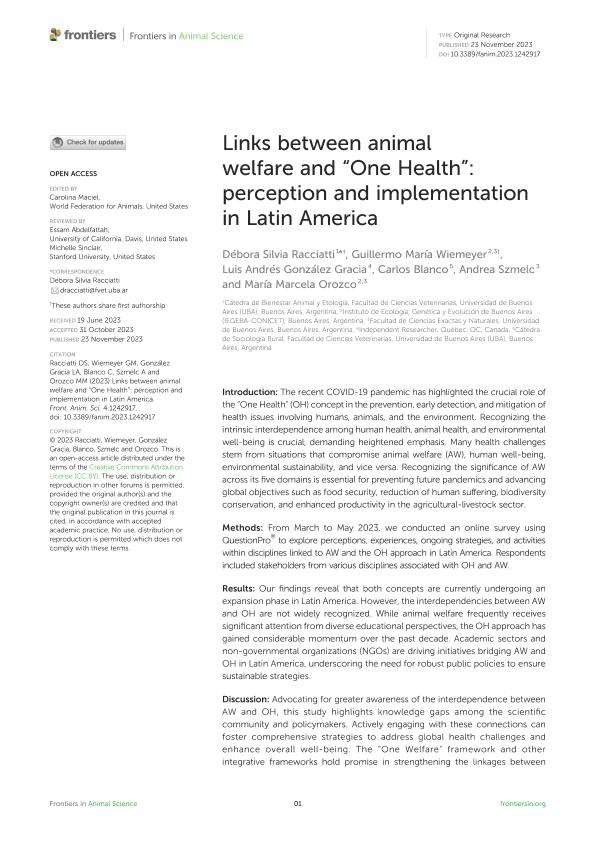Mostrar el registro sencillo del ítem
dc.contributor.author
Racciatti, Débora Silvia

dc.contributor.author
Wiemeyer, Guillermo Maria

dc.contributor.author
González Gracia, Luis Andrés
dc.contributor.author
Blanco, Carlos
dc.contributor.author
Szmelc, Andrea Tamara

dc.contributor.author
Orozco, Maria Marcela

dc.date.available
2024-02-23T14:49:05Z
dc.date.issued
2023-10
dc.identifier.citation
Racciatti, Débora Silvia; Wiemeyer, Guillermo Maria; González Gracia, Luis Andrés; Blanco, Carlos; Szmelc, Andrea Tamara; et al.; Links between animal welfare and “One Health”: perception and implementation in Latin America; Frontiers Media; Frontiers in Animal Science; 4; 10-2023; 1-21
dc.identifier.issn
2673-6225
dc.identifier.uri
http://hdl.handle.net/11336/228179
dc.description.abstract
Introduction: The recent COVID-19 pandemic has highlighted the crucial role of the “One Health” (OH) concept in the prevention, early detection, and mitigation of health issues involving humans, animals, and the environment. Recognizing the intrinsic interdependence among human health, animal health, and environmental well-being is crucial, demanding heightened emphasis. Many health challenges stem from situations that compromise animal welfare (AW), human well-being, environmental sustainability, and vice versa. Recognizing the significance of AW across its five domains is essential for preventing future pandemics and advancing global objectives such as food security, reduction of human suffering, biodiversity conservation, and enhanced productivity in the agricultural-livestock sector. Methods: From March to May 2023, we conducted an online survey using QuestionPro® to explore perceptions, experiences, ongoing strategies, and activities within disciplines linked to AW and the OH approach in Latin America. Respondents included stakeholders from various disciplines associated with OH and AW. Results: Our findings reveal that both concepts are currently undergoing an expansion phase in Latin America. However, the interdependencies between AW and OH are not widely recognized. While animal welfare frequently receives significant attention from diverse educational perspectives, the OH approach has gained considerable momentum over the past decade. Academic sectors and non-governmental organizations (NGOs) are driving initiatives bridging AW and OH in Latin America, underscoring the need for robust public policies to ensure sustainable strategies. Discussion: Advocating for greater awareness of the interdependence between AW and OH, this study highlights knowledge gaps among the scientific community and policymakers. Actively engaging with these connections can foster comprehensive strategies to address global health challenges and enhance overall well-being. The “One Welfare” framework and other integrative frameworks hold promise in strengthening the linkages between AW and OH, facilitating theory translation into practical action. Establishing comprehensive, integrated policies that unite these domains is imperative for addressing complex health challenges and advancing the welfare of both animals and humans. Further research and collaborative efforts are essential to transform these concepts into tangible, impactful outcomes.
dc.format
application/pdf
dc.language.iso
eng
dc.publisher
Frontiers Media

dc.rights
info:eu-repo/semantics/openAccess
dc.rights.uri
https://creativecommons.org/licenses/by-nc-sa/2.5/ar/
dc.subject
ANIMAL WELFARE
dc.subject
ENVIRONMENT
dc.subject
INTERDISCIPLINARY
dc.subject
ONE HEALTH
dc.subject
ONE WELFARE
dc.subject
POLICIES
dc.subject
STRATEGIES
dc.subject
SURVEY
dc.subject.classification
Otras Ciencias de la Salud

dc.subject.classification
Ciencias de la Salud

dc.subject.classification
CIENCIAS MÉDICAS Y DE LA SALUD

dc.title
Links between animal welfare and “One Health”: perception and implementation in Latin America
dc.type
info:eu-repo/semantics/article
dc.type
info:ar-repo/semantics/artículo
dc.type
info:eu-repo/semantics/publishedVersion
dc.date.updated
2024-02-22T11:05:08Z
dc.journal.volume
4
dc.journal.pagination
1-21
dc.journal.pais
Suiza

dc.journal.ciudad
Lausanne
dc.description.fil
Fil: Racciatti, Débora Silvia. Universidad de Buenos Aires. Facultad de Ciencias Veterinarias; Argentina
dc.description.fil
Fil: Wiemeyer, Guillermo Maria. Consejo Nacional de Investigaciones Científicas y Técnicas. Oficina de Coordinación Administrativa Ciudad Universitaria. Instituto de Ecología, Genética y Evolución de Buenos Aires. Universidad de Buenos Aires. Facultad de Ciencias Exactas y Naturales. Instituto de Ecología, Genética y Evolución de Buenos Aires; Argentina
dc.description.fil
Fil: González Gracia, Luis Andrés. Universidad de Buenos Aires. Facultad de Ciencias Veterinarias; Argentina
dc.description.fil
Fil: Blanco, Carlos. Universidad de Buenos Aires. Facultad de Ciencias Veterinarias; Argentina
dc.description.fil
Fil: Szmelc, Andrea Tamara. Universidad de Buenos Aires. Facultad de Ciencias Exactas y Naturales; Argentina
dc.description.fil
Fil: Orozco, Maria Marcela. Consejo Nacional de Investigaciones Científicas y Técnicas. Oficina de Coordinación Administrativa Ciudad Universitaria. Instituto de Ecología, Genética y Evolución de Buenos Aires. Universidad de Buenos Aires. Facultad de Ciencias Exactas y Naturales. Instituto de Ecología, Genética y Evolución de Buenos Aires; Argentina
dc.journal.title
Frontiers in Animal Science
dc.relation.alternativeid
info:eu-repo/semantics/altIdentifier/doi/https://doi.org/10.3389/fanim.2023.1242917
Archivos asociados
